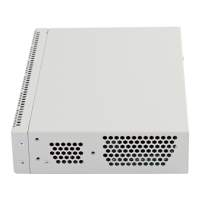•
•
•
•
•
•
•
Step Description Command Keys
esr(config-qinq-if)# ip address
dhcp
For advanced DHCP client
operation features, see section
DHCP Client management.
6 Disable the Firewall features on the
interface or enable the interface in the
security zone (see Firewall
configuration).
esr(config-qinq-if)# ip firewall
disable
esr(config-qinq-if)# security-zone
<NAME>
<NAME> – security zone name,
set by the string of up to 31
characters.
7 Set the time interval during which
statistics on the sub-interface load is
collected. (optionally).
esr(config-subif)# load-average
<TIME>
<TIME> – interval in seconds,
takes values of [5..150].
8 Set the lifetime of IPv4/IPv6 entries in
the ARP table studied on the given
interface (optionally).
esr(config-subif)# ip arp
reachable-time <TIME>
or
esr(config-subif)# ipv6 nd
reachable-time <TIME>
<TIME> – lifetime of dynamic
MAC addresses, in
milliseconds.
Allowed values are from 5000
to 100000000 milliseconds.
Real time of the entry update
varies from [0,5;1,5]*<TIME>.
9 Change MTU
(MaximumTransmitionUnit) size.
MTU above 1500 will be active only
when using the 'system jumbo-frames'
command
(optionally).
esr(config-subif)# mtu <MTU> <MTU> – MTU value in bytes.
Default value: 1500.
10 Enable recording of the current
interface usage statistics (optional).
esr(config-subif)# history statistics
11 Override the MSS (Maximum segment
size) field in incoming TCP packets
(optional).
esr(config-subif)# ip tcp adjust-
mss <MSS>
esr(config-subif)# ipv6 tcp adjust-
mss <MSS>
<MSS> – MSS value, takes
values in the range of
[500..1460].
Default value: 1460
It is also possible to configure the qinq interface:
QoS in basic or advanced mode (see section QoS management);
proxy (see section HTTP/HTTPS traffic proxying);
traffic monitoring (see sections Netflow configuration andsFlow configuration);
routing protocols functionality (see section Routing management);
VRRF protocol (see section Redundancy management);
BRAS functionality (see section BRAS (Broadband Remote Access Server) management);
IDS/IPS functionality (see section IPS/IDS configuration).

